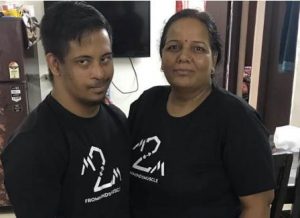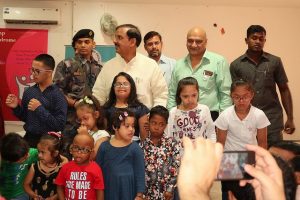Down Syndrome: Embracing the Extra Chromosome
As researchers are doing their work in finding the cause and cure of Down Syndrome, we as a society should do our work in embracing their uniqueness.

Vishal Singh wakes up at five every morning to play badminton with his father. After having a refreshing game, he comes back to get ready to go to school at eight. Returning from his school, the first thing he does is to hug his mother. Then, he freshens up and watches TV till he again goes out to play in the evening. He likes to discuss about the matches he wonwith his sisters. He lives in the moments and enjoys every bit of his life. After having his dinner, he goes back to sleep at 10 pm.
This seems like just a daily routine of any child except that it is of a 19-year-old boy with Down Syndrome (DS) or Trisomy 21. It’s a genetic disorder which affects the growth of the child both mentally and physically. It has some common physical features like short neck, flattened facial features, short head and protruding tongue. It is marked by the extra 21st chromosome in the body which makes all the difference.
“There is no scientific answer as to why this happens. But research shows that pregnant women over the age of 35 are more likely to give birth to a child with DS. 1 out of 800 children suffer from DS globally and this number is higher in India due to its high population level and unaccounted numbers in rural areas,” Brinda Iyer of Down Syndrome Federation of India (DSFI), the first organisation in India catering to the needs of children with DS and supporting their families, tells Delhi Post.
“Such children have low immunity and are more prone to heart diseases, gastrointestinal problems, leukemia and Alzheimer’s Disease. They have intellectual disability to varying degrees and developmental delays. They have difficulty in learning, remembering and understanding. This can’t be prevented nor be cured and these children need life-long support and care.”
Vishal’s mother was just 22 when he was born in a small district of Guna in Uttar Pradesh which did not have access to medical facilities to detect the probability of such genetic disorder. When he was a newborn, he did not cry. That is when she and her husband knew that something was wrong. There was problem in feeding him. But, they could not figure it out until a month when a child specialist, told them about the probability of this genetic condition. However, it was only when they came to Delhi, the position was confirmed after the tests were conducted.
Also Read: An Asperger’s Art and demystifying the disorder
“We could not think of anything. We could not understand the situation as we were too young and also we had no idea about what this syndrome was. We had heard it for the first time. But, whatever it was, we decided that we would help Vishal to the best of our capabilities. We were determined to become the strong support system for him and to do all what it would take,” Sangita, Vishal’s mother tells Delhi Post.

There were many struggles initially, major one being the admission of Vishal to a regular school. While some of the schools were not willing to take him because the teachers were not trained, the others refused because the teachers didn’t have the patience to look after his special needs along with the class of regular students. In one instance, his sister was denied admission into one of the regular school because she was told that her parents would not have much time to look after her studies and development because her brother needed attention all the time.
Despite the struggles, he got admission in NIMH Model Special Education Centre, Noida which has been quite supportive of him. Special schools like these have trained teachers, occupational therapists and speech therapists to look out for the overall development of children with special needs. Each child is given attention to and dealt with in separate ways since the abilities and level of intellectual disabilities differ from child to child. They mainly focus on vocational training such as gift wrapping, preparing envelopes and paper plates. They outline the idea of gradual development and learning at their own pace.
Vishal loves music and is very friendly. Like any other person, he is very emotional and can comprehend the body language of people around him. He can sense the vibes a person gives, whether it’s good or bad. Recently, he learned about the concept of good touch and bad touch.
His sister, Sapna says, “It is very important to teach him and other such children about these things. Not only the rates of child trafficking and molesting are higher in case of special needs children as compared to other normal children in India, but also being a part of society, he needs to understand what is acceptable and what is not.”
He is very much interested in sports. It is the continuous perseverance of his family members and his school that he got the opportunity to participate in Special Olympics Bharat 2018, Delhi, state level rounds where he won silver in Bocce game. With the efforts of his family, awareness regarding this disorder is being spread to the society where they live. It is the result of this, that Vishal is now included in the activities by the residents of the society, and has many friends in his neighbourhood. They are ushering the idea of inclusiveness of such children.
Also Read: Showing the way: Thalassemia Prevention Bill in the Parliament
Rashmi Anil Joshi, member of DSFI, emphasising on their motto ‘Let’s make an inclusive tomorrow’ tells Delhi Post, “We want the society to accept these children and not discriminate them because of their disabilities. The goal is to spread awareness and to strengthen the concept of independent sustenance and not to think of such children as burden to the society. Take for example my daughter, suffering from the same disorder working in a departmental store and she is treated just like any other employee.”
“The fact that she works and earns shows that including them in the society not only leads to the better development of such persons but also helps the society in its progression by their contribution,” says Joshi.
The children with DS make us believe that life is not a race. As long as we are attempting and moving forward, it does not matter the pace at which we do so.
